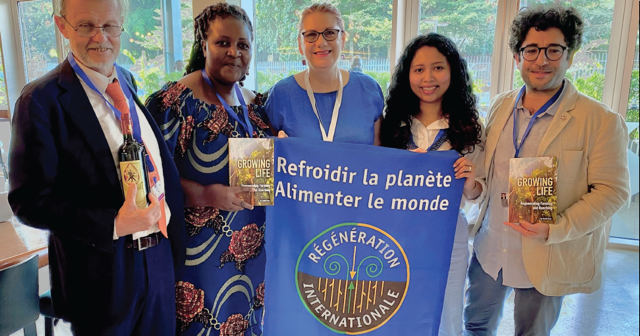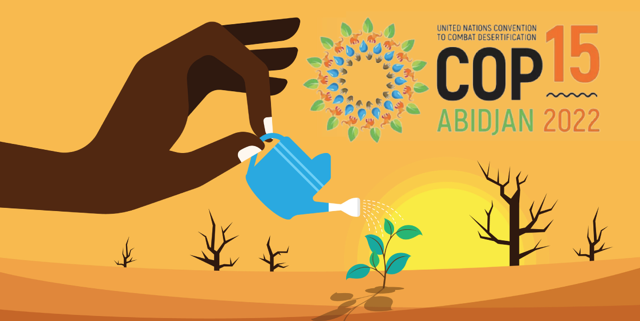Regeneration International’s Perspective of the UNCCD COP15 in Abidjan, Côte d’Ivoire
Abidjan: On the 20 of May 2022, 196 countries ratified an agreement under the United Nations Convention to Combat Desertification to neutralize land degradation and restore 1 billion hectares of land globally by 2030. Many experts see this as a vital target equivalent to the 2C global warming threshold of the UNFCCC Paris Agreement. Countries need to set themselves for new policies and frameworks to contribute to and sustain resilient landscapes in the era of anthropogenic climate change. However, from the perspective of the realities of the ground, it is not enough. Although reaching a consensus on a target is essential, on-field implementation plans are crucial to leverage countries toward their Land Degradation Neutrality (and reversal) goals – and regrettably, none were promised or put forward by any party during this COP.
However, the conference broadly highlighted the importance of agroecology in tackling desertification, a first for the UNCCD COP. A draft statement on agroecology was made by civil society calling for agroecology to be funded and for states to provide better support for agroecological youth enterprises to facilitate access to land for women and young people.
A Gender Caucus was also led by the first ladies of Cote d’Ivoire, Ghana, Democratic Republic of Congo, underlined the importance of women’s rights, gender equality, land tenure security for women in agriculture.
With billions of dollars in aid and development from first-world countries for large-scale restoration initiatives such as the Great Green Wall launched by the African Union, many developing country representatives came together at COP15 to obtain funding for their respective programs. At the same time, civil society, scientists, and researchers who are working on the ground but are not at the center of the negotiations worked tirelessly to present and recommend scalable and mostly low-cost solutions adapted to local contexts of land, people, and climate. Sadly enough, many small NGOs invested a lot of time and resources to give statements in the plenary and present best practices for land-based, community-driven solutions and deserved to be given a pedestal on the front stage during the plenary sessions of the high-level segments. But unfortunately, they were everywhere but at the center of the UNCCD COP.
To match the COP’s theme “From Scarcity to Prosperity”, Regeneration International sent a small delegation to present Agave Agroforestry systems and the work of its sister organization Vía Organíca in San Miguel Allende in Mexico. Scheduled on a Friday evening after a whole week of the conference, we received a tiny yet tightly focused audience that thankfully saw some commitment and pledges to implement a scalable land regeneration project on a Great Green Wall program.
Despite having a small crowd and an unpopular timeslot, we are very excited about this outcome. It can influence the whole Sahel region and provide ongoing support to farmer-led, assisted natural regeneration projects by helping dryland herders relieve livestock suffering from drought, famine, and lethal temperatures, rehydrate landscapes, and re-carbonize soils.
.
During our event, we had interventions from Dr.Paul Luu, the Executive Secretary, and Claudia Schepp of the International “4 per 1000” Initiative. He highlighted the importance of Regeneration International’s work. In addition, he raised the vital need for Both RI and the “4 per 1000” to gain access to funding for scaling up regenerative agriculture globally through partners such as Vía Organica and the municipality of San Miguel Allende.
Since 2007, 19 billion Euros have been injected into the Great Green Wall, and since 2021, France is providing another 14 billion Euros for its completion across 11 nations. So far, countries like Niger and Ethiopia have managed well to achieve their goals. Yet, many countries are challenged by social and political instability, unadapted policies, and corruption that sees enormous amounts of funding disappear into thin air before reaching anyone on the ground.
For land regeneration projects to be successful, sound community governance is essential, and the people on the ground need adequate resources and technical support, sustainable incomes, and access to land.

In an exclusive interview with Sena Alouka of the Alliance for Food Sovereignty in Africa (AFSA), we discussed the Billions of US Dollars in Agricultural Development that mainly go towards conventional agriculture with modern technologies such as genetically modified seeds and chemical inputs, and machinery. How big funders are used to working with industry and not familiar with small-scale farmers. When organizations such as the World Bank, IFAD, and FAO define climate-smart agriculture practices as agroecological ones, it gets even more challenging for the real agroecologists to see any funding at all.
Governments and conventions aside, small hold rural farmers are the main ones who can ensure countries reach their pledges to restore land and fix the climate. In 2022 and beyond, Regeneration International is working with its partners for agroecology and regenerative organic agriculture to gain momentum and empower farmers in the developing world. Join the movement!

